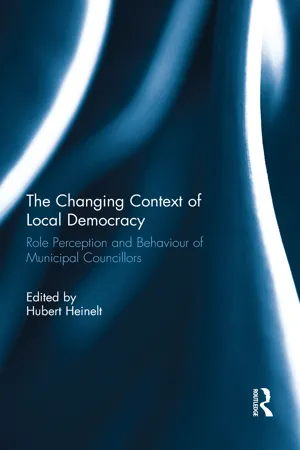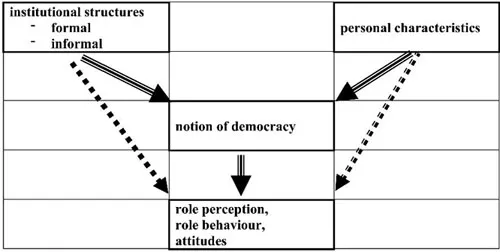![]()
Introduction: The Role Perception and Behaviour of Municipal Councillors in the Changing Context of Local Democracy
HUBERT HEINELT
Technical University of Darmstadt, Germany
Political leadership at the local level has attracted growing attention in recent years in parallel with reforms of local government and of municipal administration, as well as the debate on a shift from government to governance.1 But this debate has been mainly focused on sole leaders, i.e. mayors or executive officers. Taking into account the power triangle of (i) mayor, (ii) municipal administration (executive officers) and (iii) council, it is surprising that councillors have so far received little by way of attention. It is amazing that case studies like the one carried out in the 1960s by Eulau and Prewitt (1973) on the 82 city councils in the San Francisco Bay area have not been replicated in recent years. The aim of this special issue is to reflect on the role and task perception, as well as the behaviour, of councillors in the changing context of local democracy.
The articles collected for this special issue use a common conceptual framework sketched out in Figure 1. We start from the hypothesis that the role perception and behaviour of councillors, as well as their attitudes towards reforms at the local level, cannot be seen as being determined directly by (i) both formal and informal institutional structures and/or by (ii) personal characteristics. Instead, we argue (in line with Fishbein and Ajzen 1975 and Ajzen and Fishbein 1980) that councillors’ role perceptions and behaviour depend on their notion of democracy as an expression of their basic beliefs about appropriate behaviour and subjective norms. Relating the role perceptions and behaviour of councillors to their basic beliefs about appropriate behaviour and subjective norms still follows the basic assumption of role theory that ‘a social role is […] defined as a set of expectations oriented towards people who occupy a certain “position” in asocial system or group’ (Gouldner 1957, p. 282). Those holding the ‘position’ of councillor may reflect in their basic beliefs about appropriate behaviour the expectations oriented towards those occupying this ‘position’. However, expectations oriented towards the ‘position’ of a councillor vary according to the different concepts of democracy discussed below. Furthermore, by emphasising basic beliefs about appropriate behaviour and subjective norms, patterns of latent identities among councillors are addressed (like the more general latent identities of ‘cosmopolitans’ and ‘locals’, identified by Gouldner 1957 and 1958) which are determined by a particular understanding of democracy. In other words, we see notions of democracy as causal mechanisms between formal and informal institutional structures and the role perception and behaviour of councillors.2 However, it is an open question whether (and how far) the understanding of democracy is affected by institutional structures which offer councillors particular options to perform a specific role, thereby making it attractive for certain actors to become councillors in order to perform this specific role. Such institutional structures, and particularly horizontal power relations between the mayor, the municipal administration and the council, are determined by local government systems which differ between countries (and sometimes within countries). In this respect the question is raised of whether or not differences in the notion of democracy can be detected between countries with different local government systems. Furthermore, it is necessary to test whether the understanding of democracy depends on the personal characteristics of councillors – and not on institutional settings – as the particular options offered to councillors by the formal competences of a council may not affect (or filter out) the recruitment of actors with a specific understanding of democracy. Nevertheless, in some of the articles presented here the hypothesis will be tested empirically as to whether or not the role perception and behaviour of councillors depends directly on institutional structures as well as on personal characteristics.
Figure 1. Model for explaining role perception, role behaviour and attitudes of councillors.
All the contributions to this issue are based on the results of a survey of municipal councillors (the so-called MAELG [Municipal Assemblies in European Local Governance] survey) carried out in 2007 and 2008 in fifteen European countries and Israel.3 The data set collected by this survey includes responses from about 12,000 councillors from approximately 1,400 municipalities with more than 10,000 inhabitants selected by stratified sampling.
Municipal councils are mainly seen as representative bodies, i.e. a core institution with a particular understanding of democracy – namely representative or ‘liberal’ democracy. In the first article (‘Councillors’ Notion of Democracy and their Role Perception and Behaviour in the Changing Context of Local Democracy’) Hubert Heinelt shows that not all councillors have an understanding of democracy that accords with this model. Instead, it will be shown that there are also councillors with an understanding of democracy which is oriented towards a much broader participation of citizens than simply participating in council elections. This second understanding is in line with the deliberative model of democracy (see for an overview Cohen 2007). Furthermore, the article looks at role and task perception as well as the behaviour of councillors. It can be shown that councillors’ understanding of democracy is related to particular task perception and role behaviour, as well as to their attitudes towards local government reforms. These findings confirm that the basic beliefs and subjective norms of a person – expressed in a particular understanding of democracy – influence perceptions, attitudes and behaviour. Therefore, the initial article sets reference points for the following articles. Furthermore, it shows that institutional settings determined by different local government systems do not affect councillors’ understanding of democracy. Rather, their notion of democracy is more clearly related to personal characteristics – namely sex, age and political orientation.
The second article (‘Citizen Democracy and the Responsiveness of Councillors: The effects of democratic institutionalization on the role orientations and role behaviour of councillors’) by Bas Denters and Pieter Jan Klok addresses the impact of variations in democratic institutions on the responsiveness of local councillors in relation to their constituents. In recent years many European countries have implemented institutional reforms that have radically changed the nature of local democracy. Vetter (2009) has described these changes as a shift from party democracy to citizen democracy. The notion of citizen democracy implies a number of institutional characteristics: directly elected mayors, binding referendums, mechanisms to increase citizen influence over the choice of individual candidates, a strong position for independent parties and small local parties. Bas Denters and Pieter Jan Klok study the impact of differences in the institutional structures of local democracy on the role orientations and behaviours of councillors. Their main conclusion is that differences in the institutionalisation of local democracy have only a weak, indirect impact on the role orientation and role behaviour of councillors. Therefore the recent democratic reforms are unlikely to have led to a transformation of local systems of political representation.
In his contribution (‘The Hidden Constitutions: How informal institutions affect notions of democracy among councillors’), David Karlsson reflects on informal institutions formed and reproduced by local traditions, individuals and ad hoc circumstances. It is argued that politicians do form their notions of democracy and interpret their roles as elected representatives in relation to the institutions which regulate their practice. However, major parts of constitutional frameworks have not been written down or formalised. Instead informal institutions regulate political practice. This article identifies a number of indicators of such informal institutions based on the frequency of contacts councillors have with particular actors and the councillors’ perceptions of the influence of these actors on local politics. The results indicate that informal institutions affect the representation style of the councillor at least as much as formal institutions. For example, municipalities with an elitist power structure tend to strengthen party loyalty among councillors.
In their article (‘New Public Management Reforms and Democratic Legitimacy: Notions of Democratic Legitimacy among West European Local Councillors’), Jacob Aars and Signy Irene Vabo extend the question about the notions of democracy to the concept of democratic legitimacy. They distinguish between input-based legitimacy, resembling democratic theory, and output-based legitimacy, referring to the public performance and end results as experienced by people. Their first question is descriptive and concerns the support for alternative notions of democratic legitimacy amongst councillors. Which notion of legitimacy receives the stronger support: input-based legitimacy, associated with representative democracy and participation; or output-based legitimacy, emphasising the performance of democratic institutions – as promoted by New Public Management reforms? The second and more important question, however, seeks explanations and raises the issue of whether the view held by the councillors depends on the multi-level government system in a specific country. The hypothesis is that the more responsibility for the production of welfare services is held by local government, the more support output-oriented legitimacy measures are likely to receive. In addition, they investigate whether municipal size as well as the personal characteristics of councillors have an impact on councillors’ notions of legitimacy. They find that the measures of input-based legitimacy receive more support than the measures of output-based legitimacy. In relation to the impact of local government systems and responsibilities held by local governments, however, the findings are less straightforward. The main hypothesis gains some support, but the results are not significant.
In the final article (‘Urban Governance and its Impact on the Role Perception and Behaviour of European City Councillors’), Larissa Plüss explores the impact of different models of urban governance on councillors’ role perception and behaviour. The article is based on the main hypothesis that new forms of gove...

